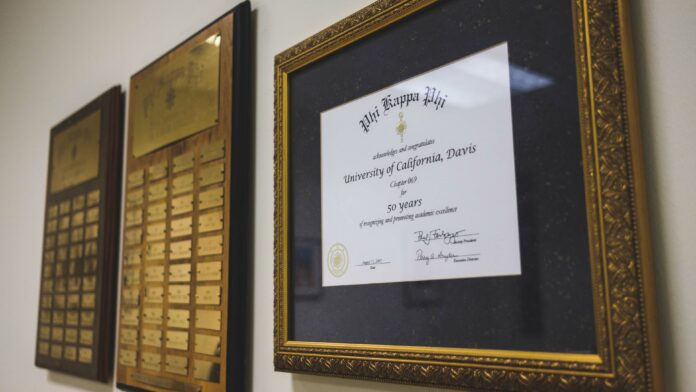Prytanean, Phi Beta Kappa among most commonly joined organizations at UC Davis
Cayley Chan, a second-year environmental policy analysis and planning major and member of the Prytanean Women’s Honor Society said she sought out the society because of her interest in finding a group of distinguished young women who support one another and give back to the community.
“Prytanean is the first women’s honor society in the United States,” Chan said. “It was started at UC Berkeley in 1952 when there were heavy disparities between men and women in universities. The founders of Prytanean wanted a space where they were able to have a voice at the university level along with bringing together a group of high-achieving women to support one another. Today, Prytanean women continue to promote the high ideals of scholarship, leadership and service wherever we go. We are a group of diverse women empowering one another to succeed in a world that seems to prevent us from doing so.”
Over the past few weeks, numerous honor societies have sent out emails to members of the student body regarding their respective application processes. These emails have been met, in part, with enthusiasm and also with criticism, as some believe honor societies aim to collect money and serve as an additional “one-liner” on a résumé. Chan, however, disputes this idea.
“Membership fees are relatively low and are often waived for low-income applicants,” Chan said. “While putting an honor society does look good on a résumé, being part of an organization that is devoted to being high-achieving, but also well-rounded, has benefits well beyond just academic achievement and résumé building.”
Chan said her most valuable takeaway from her experience as a member of the Prytanean Women’s Honor Society is learning “how much one can truly grow, learn and achieve when in the presence of others who have the same desire to succeed.”
“In my personal experience, being in Prytanean has allowed me to remind myself to take time to give back to my community and have a social life outside of academics,” she said. “Prytanean allows me to have a network of both alumni and current members who I can reach out to personally and professionally.”
Phi Beta Kappa (PBK) is another well-known honor society and is one of the oldest and most prestigious honor societies worldwide. Only about 10% of US universities have PBK chapters and, of those universities, only about 10% of the top students are invited to join. Unlike other honor societies, PBK scouts for potential members by taking into account a student’s entire academic success and the breadth of their major curriculum. Some of the organization’s notable alumni include Ralph Waldo Emerson, Theodore Roosevelt, Ruth Bader Ginsburg and Barack Obama.
Fourth-year political science major Eric Thai became a member of PBK in the fall of 2018. Thai said his interest in the organization piqued when he read through his professor’s curriculum vitae (CV) during his first year. Thai explained that being a member is not solely about achieving your goals.
“It might help enhance your chance because your mindset is reoriented to the mission of the honor society and how you live reflects the mission of the organization you associate closely with […] if you associate closely with an organization and live out its ideals,” he said. “You can achieve a lot if your commitment to an honor society shapes your mindset and attitude to something that’s positive and productive.”
Animal behavior Ph.D. candidate Ryane Logsdon has been a member of PBK since her third year as an undergraduate. Logsdon said that although she tries not to rely on external validation, her invitation into PBK “was incredibly important” to her.
“Especially when I started graduate school and imposter syndrome kicked in,” Logsdon said. “Imposter syndrome is having the idea that you aren’t deserving to be where you are and that you’re a fraud who will eventually be found out. Most graduate students deal with it at some point in their career. It was reassuring to have this reminder that I have been recognized as someone with academic skills and I deserve to be in my Ph.D. program.”
Logsdon also said that attending PBK events has introduced her “to a myriad of brilliant, diverse individuals who have taught me a lot.” Logsdon’s membership in the organization has also helped her achieve both personal and professional goals.
“Earlier this year, solely because of my initiation into Phi Beta Kappa as an undergraduate, I was eligible for a grant from the Phi Beta Kappa Northern California Association,” Logsdon said. “I applied for and received this grant, which helped fund my graduate work this year.”
As a result of the connections she made at this ceremony, Logsdon was invited to speak at a conference next year and has had an article written about her and her research.
“Opportunities like these are incredible,” she said. “They give me the chance to share my research with a group of individuals outside my specific field of study, which is one of my primary goals as a scientist: to increase scientific literacy and interest in the general public. Plus, receiving grants and being invited to conferences also continues to boost my CV and résumé.”
Logsdon advises students to seriously consider joining an honor society.
“I would highly recommend joining,” Lodgson said. “Recognize that you have been selected not just for your grades, but because you are a well-rounded student with great potential. Membership is lifelong, and the opportunities, networking and connections it provides can help you long after you graduate college.”
Written by: Sneha Ramachandran — features@theaggie.org




